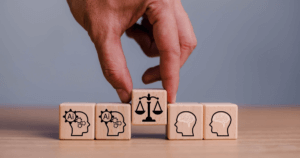Can We Trust AI? TickTock parent ByteDance-OpenAI Clash Raises Concerns
Introduction
The intersection of technology giants ByteDance and OpenAI has sparked a significant discussion in the AI industry. Recent reports by The Verge and Business Insider have brought to light the alleged misuse of OpenAI’s technology by ByteDance, raising questions about compliance and ethics in AI development.
The Core of the Controversy
TikTock parent company ByteDance’s Alleged Misuse
ByteDance, the parent company behind the popular app TikTok, reportedly used OpenAI’s technology in developing its own large language model. This action directly contradicts the terms set by OpenAI, which prohibit the use of their technology to develop competing AI models or extracting data through means other than the provided APIs (Application Programming Interfaces).
Internal Tactics
It was also reported that ByteDance employed “data desensitization” techniques to conceal this usage, as evidenced by internal communications viewed by The Verge.
Post-Regulatory Approval Actions
Even after ByteDance’s chatbot, Doubao, received regulatory approval in China, the company allegedly continued to use OpenAI’s API to assess its chatbot’s performance.
OpenAI’s Standpoint and ByteDance’s Response
OpenAI’s Action
In response to these allegations, OpenAI confirmed the suspension of ByteDance’s account due to a breach of terms. Niko Felix, an OpenAI spokesperson, emphasized the importance of adhering to usage policies for responsible technology use.
ByteDance’s Defense
ByteDance, in a statement to Business Insider, denied any misuse of OpenAI’s technology. They clarified that their use of GPT APIs was licensed by Microsoft and that their self-developed model, not OpenAI’s tech, powers Doubao in China.
Broader Implications in the AI Industry
Compliance and Ethical Concerns
This incident underscores the growing need for strict compliance and ethical standards in AI development. The ByteDance-OpenAI case serves as a cautionary tale about the potential misuse of advanced AI technologies.
Innovation vs. Regulation
The challenge for companies like ByteDance is to innovate responsibly while adhering to established guidelines and regulations, a delicate balance in the fast-evolving AI sector.
ByteDance’s AI Expansion
Entering the AI Market
ByteDance is expanding its presence in the AI industry. Recent reports suggest the company is developing a platform to rival OpenAI’s customizable ChatGPT bots, marking a significant step in their AI ambitions.
Regulatory Scrutiny
This expansion comes amid heightened scrutiny from regulators, particularly in the US, concerning data privacy and security, especially given ByteDance’s Chinese origins.
Analysis and Future Outlook:

As we delve deeper into the ByteDance-OpenAI situation, it’s crucial to reflect on the broader implications for the AI industry and what this means for future technological developments.
The Need for Clearer Guidelines in AI
The ByteDance incident highlights a pressing need for clearer, more universally accepted guidelines in AI development. As AI technology becomes more sophisticated, the line between innovative use and potential misuse becomes increasingly blurred. This calls for a global consensus on what constitutes ethical AI use, ensuring that advancements in this field are aligned with societal values and norms.
Balancing Innovation with Ethical Responsibility
One of the key challenges in AI development is balancing the pursuit of groundbreaking innovations with ethical responsibilities. Companies like ByteDance are at the forefront of AI research and development, pushing the boundaries of what’s possible. However, this ambition must be tempered with a strong commitment to ethical standards. As AI becomes more integrated into our daily lives, the potential for misuse or unintended consequences grows. This makes it imperative for companies to prioritize ethical considerations as much as technological advancements.
The Role of Regulation and Oversight
There is also a growing need for regulatory frameworks that can keep pace with technological advancements. Current regulations may not adequately address the rapid developments in AI, leading to grey areas that companies can exploit. A more robust and adaptive regulatory environment is needed to ensure that AI technologies are developed and used responsibly. This includes not just national regulations but also international cooperation to address the global nature of technology companies and their reach.
Encouraging Ethical AI Cultures
Companies must cultivate an internal culture that prioritizes ethical considerations in AI development. This involves training and awareness programs for employees, establishing clear ethical guidelines, and creating accountability mechanisms. By fostering an environment where ethical AI is a core value, companies can mitigate the risks associated with AI misuse.
The Importance of Transparency and Accountability
Transparency and accountability are key in building trust in AI systems. Companies should be transparent about how their AI models are developed, trained, and used. This transparency, coupled with accountability for any misuse or harm caused by these technologies, is crucial for maintaining public trust in AI.
Final Thoughts
The ByteDance and OpenAI case serves as a wake-up call for the AI industry. It underscores the importance of ethical AI development and the need for clearer guidelines, balanced innovation, effective regulation, ethical corporate culture, and transparency. As AI continues to evolve, these principles will be essential in navigating the ethical landscape of AI, ensuring that the benefits of AI are realized while minimizing potential harms.




